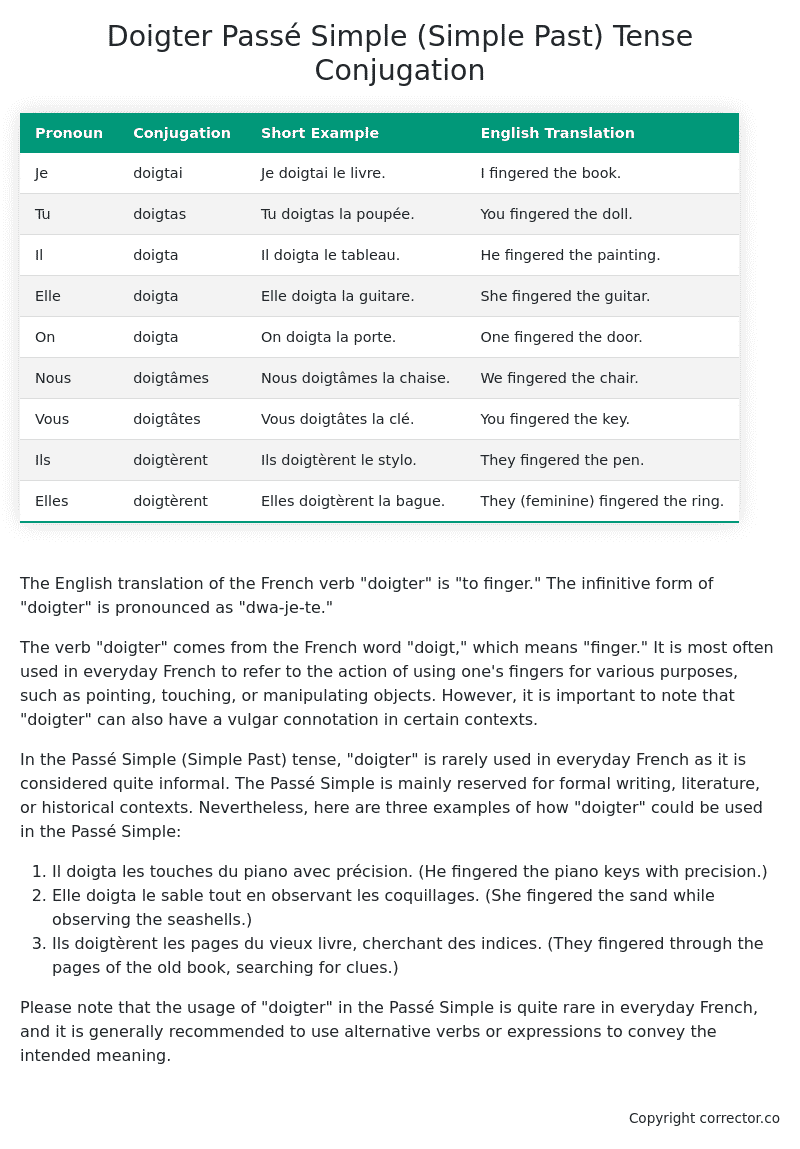Passé Simple (Simple Past) Tense Conjugation of the French Verb doigter
Introduction to the verb doigter
The English translation of the French verb “doigter” is “to finger.” The infinitive form of “doigter” is pronounced as “dwa-je-te.”
The verb “doigter” comes from the French word “doigt,” which means “finger.” It is most often used in everyday French to refer to the action of using one’s fingers for various purposes, such as pointing, touching, or manipulating objects. However, it is important to note that “doigter” can also have a vulgar connotation in certain contexts.
In the Passé Simple (Simple Past) tense, “doigter” is rarely used in everyday French as it is considered quite informal. The Passé Simple is mainly reserved for formal writing, literature, or historical contexts. Nevertheless, here are three examples of how “doigter” could be used in the Passé Simple:
- Il doigta les touches du piano avec précision. (He fingered the piano keys with precision.)
- Elle doigta le sable tout en observant les coquillages. (She fingered the sand while observing the seashells.)
- Ils doigtèrent les pages du vieux livre, cherchant des indices. (They fingered through the pages of the old book, searching for clues.)
Please note that the usage of “doigter” in the Passé Simple is quite rare in everyday French, and it is generally recommended to use alternative verbs or expressions to convey the intended meaning.
Table of the Passé Simple (Simple Past) Tense Conjugation of doigter
| Pronoun | Conjugation | Short Example | English Translation |
|---|---|---|---|
| Je | doigtai | Je doigtai le livre. | I fingered the book. |
| Tu | doigtas | Tu doigtas la poupée. | You fingered the doll. |
| Il | doigta | Il doigta le tableau. | He fingered the painting. |
| Elle | doigta | Elle doigta la guitare. | She fingered the guitar. |
| On | doigta | On doigta la porte. | One fingered the door. |
| Nous | doigtâmes | Nous doigtâmes la chaise. | We fingered the chair. |
| Vous | doigtâtes | Vous doigtâtes la clé. | You fingered the key. |
| Ils | doigtèrent | Ils doigtèrent le stylo. | They fingered the pen. |
| Elles | doigtèrent | Elles doigtèrent la bague. | They (feminine) fingered the ring. |
Other Conjugations for Doigter.
Le Present (Present Tense) Conjugation of the French Verb doigter
Imparfait (Imperfect) Tense Conjugation of the French Verb doigter
Passé Simple (Simple Past) Tense Conjugation of the French Verb doigter (You’re reading it right now!)
Passé Composé (Present Perfect) Tense Conjugation of the French Verb doigter
Futur Simple (Simple Future) Tense Conjugation of the French Verb doigter
Futur Proche (Near Future) Tense Conjugation of the French Verb doigter
Plus-que-parfait (Pluperfect) Tense Conjugation of the French Verb doigter
Passé Antérieur (Past Anterior) Tense Conjugation of the French Verb doigter
Futur Antérieur (Future Anterior) Tense Conjugation of the French Verb doigter
Subjonctif Présent (Subjunctive Present) Tense Conjugation of the French Verb doigter
Subjonctif Passé (Subjunctive Past) Tense Conjugation of the French Verb doigter
Subjonctif Imparfait (Subjunctive Imperfect) Tense Conjugation of the French Verb doigter
Subjonctif Plus-que-parfait (Subjunctive Pluperfect) Tense Conjugation of the French Verb doigter
Conditionnel Présent (Conditional Present) Tense Conjugation of the French Verb doigter
Conditionnel Passé (Conditional Past) Tense Conjugation of the French Verb doigter
Conditionnel Passé II (Conditional Past II) Tense Conjugation of the French Verb doigter
L’impératif Présent (Imperative Present) Tense Conjugation of the French Verb doigter
L’impératif Passé (Imperative Past) Tense Conjugation of the French Verb doigter
L’infinitif Présent (Infinitive Present) Tense Conjugation of the French Verb doigter
L’infinitif Passé (Infinitive Past) Tense Conjugation of the French Verb doigter
Le Participe Présent (Present Participle) Tense Conjugation of the French Verb doigter
Le Participe Passé (Past Participle) Tense Conjugation of the French Verb doigter
Struggling with French verbs or the language in general? Why not use our free French Grammar Checker – no registration required!
Get a FREE Download Study Sheet of this Conjugation 🔥
Simply right click the image below, click “save image” and get your free reference for the doigter Passé Simple tense conjugation!

Doigter – About the French Passé Simple (Simple Past) Tense
Formation
Usage
Narration
Historical Context
Interactions with other tenses
Passé Composé
Imparfait
Conditional and Subjunctive
Summary
I hope you enjoyed this article on the verb doigter. Still in a learning mood? Check out another TOTALLY random French verb conjugation!


